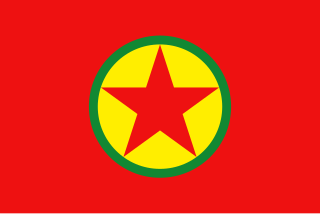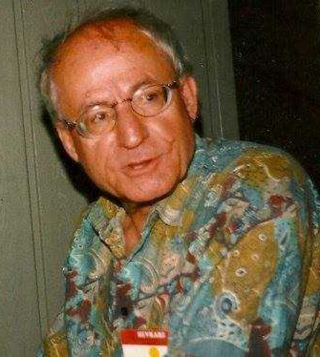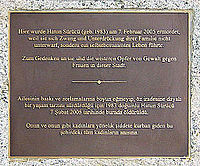
The Kurdistan Workers' Party or PKK is a Kurdish militant political organization and armed guerrilla movement which historically operated throughout Kurdistan but is now primarily based in the mountainous Kurdish-majority regions of southeastern Turkey and northern Iraq. It was founded in Ziyaret, Lice on 27 November 1978 and has been involved in asymmetric warfare in the Kurdish–Turkish conflict. Although the PKK initially sought an independent Kurdish state, in the 1990s its official platform changed to seeking autonomy and increased political and cultural rights for Kurds within Turkey.

Jamal Nebez was a Kurdish linguist, mathematician, politician, author, translator and writer. He studied Islamic law, philosophy, theology, physics and mathematics at the University of Baghdad in the 1950s. In 1956, he prepared a stenciled script on algebra and in 1960, succeeded in publishing the first physics book in Kurdish, including a rich glossary of Kurdish terms pertaining to physics and mathematics. He translated several literary works, including works of Nikolai Gogol and William Shakespeare into Kurdish. He also wrote and published several books on a variety of topics. Most of the books are mainly about topics related to Kurds.

Kurdish culture is a group of distinctive cultural traits practiced by Kurdish people. The Kurdish culture is a legacy from ancient peoples who shaped modern Kurds and their society.

The Kurdish population is estimated to be between 30 and 45 million. Most Kurdish people live in Kurdistan, which today is split between Iranian Kurdistan, Iraqi Kurdistan, Turkish Kurdistan, and Syrian Kurdistan.

Kurds in the United States refers to people born in or residing in the United States of Kurdish origin or those considered to be ethnic Kurds.

Kurds in Sweden may refer to people born in or residing in Sweden who are of Kurdish origin.
Kurds in Switzerland are residents in Switzerland of full or partial Kurds origin. The Kurds in Switzerland mainly reside in the Cantons of Zurich, Aargau and Basel-Stadt and are descendants of migrants of refugees from the regions around Pazarcık, Kahraranmaraş or Erzincan. There are also shia kurdish migrants from Iranian Kurdistan, the region around Ilam and Kermanshah along with Feyli Kurds from Baghdad who mainly reside Geneva and Zürich
The problem of Kurdish refugees and displaced people arose in the 20th century in the Middle East, and continues today. The Kurds, are an ethnic group in Western Asia, mostly inhabiting a region known as Kurdistan, which includes adjacent parts of Iran, Iraq, Syria, and Turkey.

The Democratic Union Party is a Kurdish left-wing political party established on 20 September 2003 in northern Syria. It is a founding member of the National Coordination Body for Democratic Change. It is the leading political party among Syrian Kurds. The PYD was established as a Syrian branch of the Kurdistan Workers Party (PKK) in 2003, and both organizations are still closely affiliated through the Kurdistan Communities Union (KCK).

The People's Defense Units (YPG), also called People's Protection Units, is a socialist US-backed Kurdish militant group in Syria and the primary component of the Syrian Democratic Forces (SDF).

Kurds in France may refer to people born in or residing in France of full or partial Kurds origin.

Kurds in Finland refers to Kurds living in Finland. In 2022 there were 16,603 Kurdish speakers in Finland.

Syrian Kurdistan or Rojava is a region in northern Syria where Kurds form the majority. It is surrounding three noncontiguous enclaves along the Turkish and Iraqi borders: Afrin in the northwest, Kobani in the north, and Jazira in the northeast.

Kurds in the Netherlands may refer to people born in or residing in the Netherlands of Kurdish origin.
In the early morning of 25 April 2017, the Turkish Air Force conducted multiple airstrikes against media centers and headquarters of the People's Protection Units (YPG) and the Women's Protection Units (YPJ) in northeastern Syria, and against positions of the Sinjar Resistance Units (YBŞ) on Mount Sinjar, northwestern Iraq. The airstrikes killed 20 YPG and YPJ fighters in Syria in addition to five Peshmerga soldiers in Iraq.

Düzen Tekkal is a German author, television journalist, filmmaker, war correspondent, political scientist, and social entrepreneur of Kurdish descent. She is Yazidi.
Kurds in Greece are the people in Greece of Kurdish origin. Kurds have primarily migrated to Greece due to war and persecution. Most asylum seekers in Greece during the 1990s were Kurds from mainly Iraq but also from southeastern Turkey. A total of 43,759 Kurds entered in Greece in the latter part of 1990s, in which 40,932 were from Iraq and 2,827 from Turkey. However, only 9,797 of these sought asylum in Greece.
Şêxbizin is a Kurdish tribe present near Koy Sanjaq in Kurdistan Region, Iraq with smaller communities dispersed throughout Turkey. While the tribe speaks Sorani in Kurdistan Region, the ones in Turkey have kept their tribal sub-dialect of Laki called Şêxbizinî or Kirmancekîman. Nonetheless, many in Turkey only know Turkish due to the assimilatory policies of Turkey.

The single largest community in the United States of ethnic Kurds exists in Nashville, Tennessee. This enclave is often called "Little Kurdistan" and is located in South Nashville. The majority of Nashville's "Little Kurdistan" comes from Iraqi Kurdistan, however there are sizeable communities of Kurds from Syria, Iran, and Turkey. It has been estimated that there are 15,000 Kurds living in Nashville, although more recent estimates place the number at around 20,000, the largest in the country.
Ferdinand Hennerbichler is an Austrian historian, philologist, anthropologist, and a prominent Kurdologist. He is also a former diplomat and journalist.












